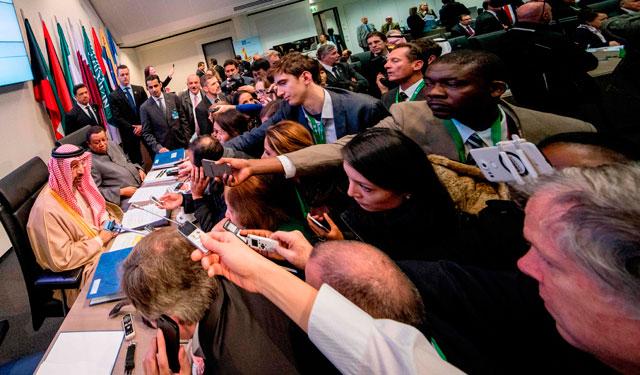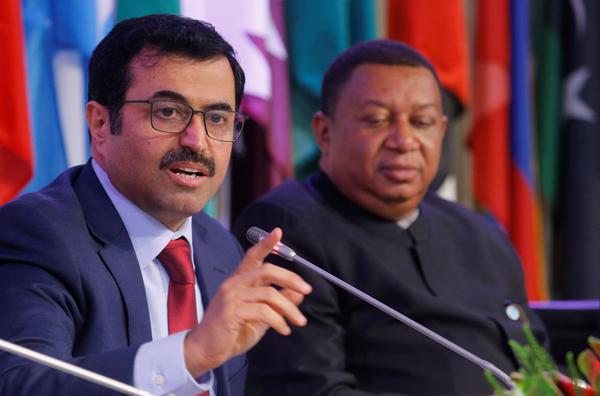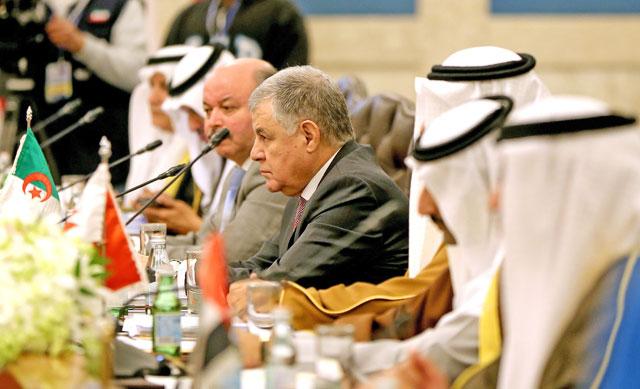You are here
OPEC agrees oil cut extension to end of 2018
By Reuters - Nov 30,2017 - Last updated at Nov 30,2017

Saudi Arabia’s Energy Minister Khaled Al Falih (left) and OPEC Secretary General Mohammed Barkindo (2nd left) answer journalsists at the start of the 173rd OPEC Conference of Organisation of the Petroleum Exporting Countries in Vienna, on Thursday (AFP photo)
VIENNA — The Organisation of Petroleum Exporting Countries (OPEC) agreed on Thursday to extend oil output cuts until the end of 2018 as it tries to finish clearing a global glut of crude. OPEC also signalled it could exit the deal earlier if the market overheats.
Non-OPEC Russia, which this year reduced production significantly with OPEC for the first time, has been pushing for a clear message on how to exit the cuts so the market does not flip into a deficit too soon, prices do not rally too fast and rival US shale firms do not boost output further.
The producers’ current deal, under which they are cutting supply by about 1.8 million barrels per day (bpd) in an effort to boost oil prices, expires in March.
Two OPEC delegates told Reuters the group had agreed to extend the cuts by nine months until the end of 2018, as largely anticipated by the market.
OPEC also decided to cap the output of Nigeria at around 1.8 million bpd but had yet to agree a cap for Libya. Both countries have been previously exempt from cuts due to unrest and lower-than-normal production.
OPEC was still scheduled to meet with non-OPEC producers led by Russia after (15:00 GMT).
Before the meeting of the organisation member states started at its headquarters in Vienna on Thursday, Saudi Energy Minister Khalid Al Falih said it was premature to talk about exiting the cuts at least for a couple of quarters and added that the group would examine progress at its next meeting in June.
“When we get to an exit, we are going to do it very gradually... to make sure we don’t shock the market,” he said.
The Iraqi, Iranian and Angolan oil ministers also said a review of the deal was possible in June in case the market became too tight.
International benchmark Brent crude rose more than 1 per cent on Thursday to trade near $64 per barrel.
Capping Nigeria, Libya
With oil prices rising above $60, Russia has expressed concerns that such an extension could prompt a spike in crude production in the United States, which is not participating in the deal.
Russia needs much lower oil prices to balance its budget than OPEC’s leader Saudi Arabia, which is preparing a stock market listing for national energy champion Aramco next year and would hence benefit from pricier crude.
“Prices will be well supported in December with a large global stock draw. The market could surprise to the upside with even $70 per barrel for Brent not out of the question if there is an unexpected interruption in supply,” said Gary Ross, a veteran OPEC watcher and founder of Pira consultancy.
The production cuts have been in place since the start of 2017 and helped halve an excess of global oil stocks although those remain at 140 million barrels above the five-year average, according to OPEC.
Russia has signalled it wants to understand better how producers will exit from the cuts as it needs to provide guidance to its private and state energy companies.
“It is important... to work out a strategy which we will follow from April 2018,” Russian Energy Minister Alexander Novak said on Wednesday.
Related Articles
NEW YORK — Oil prices soared more than 8 per cent on Wednesday as some of the world's largest oil producers agreed to curb oil output for th
KUWAIT CITY — Kuwaiti Oil Minister Essam Al Marzouk on Sunday said the international crude market is expected to rebalance in the fourth qua
ALGIERS — Iran downplayed on Monday the chances of OPEC and non-OPEC oil producers clinching an output-restraint deal in Algeria this week e














